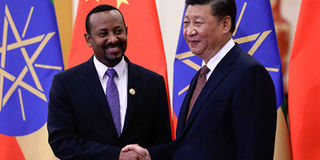Africans must analyse lending by China, ensure it’s in their interest

Ethiopia's Prime Minister Abiy Ahmed (left) shakes hands with China's President Xi Jinping before their bilateral meeting at the Great Hall of the People in Beijing on September 2, 2018. PHOTO | ANDY WONG | AFP
What you need to know:
- Africans must critically analyse Chinese lending and act in their best interests, not Beijing’s or the West’s.
- Africa’s technocrats, intelligentsia, policymakers and political leadership and AU first, and then the UN, must not allow Africans to drive or be driven blind into economic penury.
“Africa’s lions are surging forward, China’s development is unstoppable”- Xinhua
The triennial powwow named Forum for China-Africa Cooperation (Focac) where Beijing played host to all but one of Africa’s 54 heads of state and or government riveted the world’s attention.
Why would the entire African leadership troop to Beijing? Why is this two-day indaba important? Herewith six basic markers about China:
In August 2010, China overtook Japan to become the world’s second largest economy. Tokyo itself reported that China’s Gross Domestic Product (GDP) stood at $1.337 trillion (Sh100tn) to Japan’s $1.288 trillion.
In 2013, China overtook the US as the world’s leading trading nation in goods. That means China’s annual trade in goods surpassed $3.87 trillion for the first time.
In September, 2013 China overtook the US (6.3 million barrels per day) to become the world’s biggest net importer of oil (6.24 million barrels per day) driven by faster economic growth.
On December 3, 2013, Bloomberg reported that “China’s Yuan overtook the euro to become the second most used currency in global finance after the dollar”.
PUBLIC DEBT
On July 19, 2014 CCTV (now CGTN) reported that Beijing’s train transit system that year become the world’s biggest when it ferried 10 million passengers; and according to the New York Times of August 15, 2010, it is expected that China will unseat the US as the world’s largest economy as early as 2030.
Now with regard to Africa, Beijing has emerged as the leading lender to African countries. Let me bring the story home.
Kenya’s public debt now stands at over Sh5 trillion (US$50 billion). China is Kenya’s largest lender accounting for above 70 percent of its bilateral debt (the debt between countries).
Beijing has lent to Kenya eight times more than the next bilateral lender which is France. The story of massive and still growing Chinese debt is replicated across the African continent.
ADDICTIVE LOANS
In the Horn of Africa tiny Djibouti owes China US$1.2 billion, which nearly equals the country’s annual economic production.
As Zambia sought to restructure the repayment of its debt in the lead up to Focac, the question was whether Africans will repay the large loans and what would happen if they did not.
Attention rightly focussed on the loans and boiled down to an attack on China’s relationship with Africa.
Beijing’s lending and involvement in Africa’s economic development was drummed up as debt-book (instead of textbook) diplomacy; debt-trap (a reminder of a death-trap) diplomacy; predator economics; economic colonialism; and the opium of Africans.
Yes, opium! Listen to Grant Harris, President Barack Obama’s former adviser on Africa, writing in Time magazine:
“Chinese debt has become the methamphetamines of infrastructure finance: highly addictive, readily available and with long term negative effects that far outweigh any temporary high.”
PRIORITY
Now, were all those African VVIPs and policymakers who gathered in Beijing last week, in Johannesburg three years earlier, and Beijing in 2009, passive participants in a conference leading their countries and continent into economic bondage?
Dr Mahathir Mohammed recently returned from retirement and elected again as Malaysian Prime Minister, travelled to Beijing and cancelled a rail and gas projects worth US$20 billion.
Why? He said they were not priority and would bankrupt Kuala Lumpur. Africans must critically analyse Chinese lending and act in their best interests, not Beijing’s or the West’s.
The 1980s are called Africa’s lost decade because the continent was mired in debt from the West which was followed by the excruciatingly painful Structural Adjustment Programmes.
ECONOMIC BONDAGE
Africa’s leadership must not allow what the dominant West did to Africa then to be repeated by the rising superpower that is China.
The UN attends Focac and Secretary-General Antonio Guterres was in Beijing. The African Union is a member of Focac and Chairman Moussa Faki Mahamat was in Beijing too.
Africa’s technocrats, intelligentsia, policymakers and political leadership and AU first, and then the UN, must not allow Africans to drive or be driven blind into economic penury.
I believe President Xi Jinping when he says only China and Africans can judge their cooperation.
Therefore, Africa’s thinkers should take a hard and long look at the taking over of Sri Lanka’s Beijing-built Port of Hambantota early in the year by Chinese companies and ask even harder questions as to its viability or whether it should have been built in the first place.
Africa’s economies must surge – grow at 10 percent - as they help China develop. The struggle continues.





